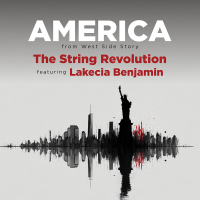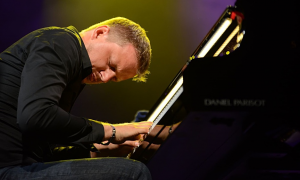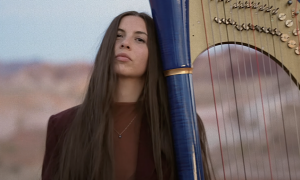Home » Jazz Articles » Interview » Benevento/Russo Duo: Hero Rock, Mind-Reading and Constant Movement
Benevento/Russo Duo: Hero Rock, Mind-Reading and Constant Movement
JR: Well, Sunny's the same bitch that left me for "Memphis. Then "Powder is about another girl. They all do have a little bit of something. The only time I'm inspired to really write is through some sort of either happy or sad relationship. Which is kind of the basis of songwriting anyway—even though we don't have lyrics.
AAJ: Well, people were probably making emotional music before anyone ever wrote a lyric down.
JR: Yeah, exactly. It's cool to see that that's coming across, too. Because trying to convey emotion without lyrics is a little more difficult, so we're happy with how it is coming across—how we are able to convey that.
AAJ: So these are pretty concise songs with specific parts. How much do the songs change live night to night? How structured are your sets?
MB: They're pretty structured. My fiancée even told me, "I don't even know what's a good Duo show. You guys play a lot of the same songs. Of course the show was good; it was like every other show.
AAJ: Must have felt great to hear that.
 MB: I know. She went on to see some shows on this tour, and she saw us go into different improvisations. She knows that there are good Duo shows, and we do do some improv. But for the most part, our shows are pretty dialed-in. We want people to hear us play the tunes that are on the new album live. But even though we play close to the same set every night, we're in a different place. So the people in San Diego didn't drive on to Tucson to hear us play there as well, and the people in Eugene, Oregon didn't drive down to San Francisco to see the show there. I mean, even if they do—we do have some people traveling with us—it's not as if that makes it boring. I think we get into sculpting a set, and figuring out what songs should go next.
MB: I know. She went on to see some shows on this tour, and she saw us go into different improvisations. She knows that there are good Duo shows, and we do do some improv. But for the most part, our shows are pretty dialed-in. We want people to hear us play the tunes that are on the new album live. But even though we play close to the same set every night, we're in a different place. So the people in San Diego didn't drive on to Tucson to hear us play there as well, and the people in Eugene, Oregon didn't drive down to San Francisco to see the show there. I mean, even if they do—we do have some people traveling with us—it's not as if that makes it boring. I think we get into sculpting a set, and figuring out what songs should go next. We just did two nights at the Independent [in San Francisco] and we were thinking, "What should we do? Because we're pretty much playing the same shit. But we have some songs we haven't played since we were at the Knitting Factory, some old ones we can throw in there. The big surprises at the sets are the free-for-all improv in "Three Question Marks —that's always a surprise; who knows what's going to happen for that one. We also play this song "Impact by this band called Combustible Edison— we play it a lot faster and a lot more aggressively than they do, but that's a song with some real improvisation. "Scratchitti is also a song where who the hell knows what's going to happen. But we do have our sculpted set and then some tunes where we know something's going to happen—someone's going to do something that surprises the other person.
JR: A good amount of the songs are pretty true to the recordings. There are always going to be embellishments, and there's always room to play around, but most of the songs on the new record are pretty much performed as is. Except for one like "Hate Frame, which has a little more of an openness where we can mess around some. That one is kind of our go-nuts tune, and there aren't any rules there. I mean, there's a form, but once that form section is over, it's pretty haphazard. We will stretch sections of the songs. Like when we play "Play Pause Stop, we'll open up a little bit more and Marco will stretch that white-noise section. "Something for Rockets is more interactive live at its end, you know—that repeating line. There's a drum solo and a keyboard solo over that line now to give it a little live flavor.
MB: You know, we've got to play the album because we want to sell it—we want people to hear the tunes. Also, just as musicians in the band, we have a certain comfort zone in our music. This isn't a bad comfort zone; it's a good thing where we go up on stage and put on a show with our songs. It's like Led Zeppelin—you'd go see them and they'd do "The Ocean and "Whole Lotta Love, all the songs that you'd want to hear.
AAJ: Well, this is nothing any group needs to apologize for. Rock bands—Radiohead, Metallica, anyone—are going to do their show, their set of tunes. And every show isn't the same; if you think it is, you haven't seen a band three weeks into the tour, as opposed to the first or second night out.
MB: Exactly. When I'm on tour, I frequently fuck up—you know, going into the next section, that sort of thing. Every day is different—one day I'll be thinking, "Oh man, I just missed that chord. I totally missed where I was supposed to go. Sometimes it's because you're farther into the tour, and you didn't pay attention, whereas the first or second night, you're focused.
AAJ: You're obviously a complete road band—although you're one of the great road bands that also makes really good records as well. You guys spend long, long periods touring. Does this make writing music easier or harder?
JR: In a sense it makes it harder, because we don't get a lot of time to write. But when we do, we're really psyched to do it, so it makes it easer. We get to a point where we haven't sat down together in a really long time to consciously work out songs. And actually, we're at that point now—we haven't done anything like that since January. Every time we've had off recently has just been vacation time because we've been so busy. So after this Saturday, we are going to be off for two weeks, and we're so excited to work some stuff up and let out that energy we've built up. We've been playing the same songs for a while, so we are excited to hear some new sounds. We started working on a new thing last night at sound check, and it felt so good to get in that mode again. When we've been bottled up and not writing, and then we do get a chance, we're so bottled up that a lot of ideas just flow out. Which is what happened with writing the last four tracks on this record—we sat down and the ideas were just flowing. So that's how things work: we choke ourselves, and then we let it all out.
AAJ: You're in a situation that to me, is the best of all musical worlds, in that you can play completely compellingly as the Duo, but can also accommodate any number of other players such as [former Phish bassist and guitarist] Mike Gordon and Trey Anastasio on the recent tour you did with them, or Skerik and Mike Dillon with the side group Duo Buggin', or just as guests with the Duo—obviously the list of friends and collaborators goes really deep. Does it take any real adjustment for you and Joe to play with other guys or is it just completely natural to make that switch from two to three to four players? JR: It depends. Outside the Duo, it varies a lot. Playing with Skerik and Mike D. is a lot different than playing with Trey and Gordon. I think that when me and Marco and Skerik and Mike get together, it's just an open forum for craziness. That's its own thing. And when we did the tour with Trey and Mike Gordon, we had to change our playing style a bit. The song list we were playing put us in more of a background kind of role—playing as a drummer and a keyboardist instead of two guys who normally are alpha-male bandleaders. We had to take a backseat. And that was great; it is great to get to play in different situations and to perform in different ways. Going into it, we were really figuring out our role, and by the middle of the tour, we found that role—then everyone started playing a lot better together and it was really comfortable. It really varies from situation to situation. So I'd say it's easy to meld, but it does take a little bit of time sometimes.
JR: It depends. Outside the Duo, it varies a lot. Playing with Skerik and Mike D. is a lot different than playing with Trey and Gordon. I think that when me and Marco and Skerik and Mike get together, it's just an open forum for craziness. That's its own thing. And when we did the tour with Trey and Mike Gordon, we had to change our playing style a bit. The song list we were playing put us in more of a background kind of role—playing as a drummer and a keyboardist instead of two guys who normally are alpha-male bandleaders. We had to take a backseat. And that was great; it is great to get to play in different situations and to perform in different ways. Going into it, we were really figuring out our role, and by the middle of the tour, we found that role—then everyone started playing a lot better together and it was really comfortable. It really varies from situation to situation. So I'd say it's easy to meld, but it does take a little bit of time sometimes.
MB: Whenever we play with other people, we kind of change the repertoire a little bit. It would be a different story if we were on a Duo tour and we had a guitarist and bassist learning our songs and playing the music with us and improvising with us. Then it would be pretty hard, because Joe and I have this kind of mind-reading thing where we as improvisers are pretty good at following each other, pretty good at surprising ourselves at how we will land on a certain part of the beat or on a certain chord. We're good at finding a certain flow within an improvisation. And as soon as you add another person to the mix, it definitely turns me and Joe into two people who are now accommodating a third member—which is cool, but Joe and I have been playing as a duo for almost five years now, so it feels less natural when you add another member. Which is totally natural.
But for the most part, most people that play with us find that it's really easy, because Joe and I have such a strong thing on our own that we create a nice little pad for Skerik or Mike D. or for any guitarist, like Brad Barr from The Slip. So it is kind of easy; for them it's like playing with a bassist, a keyboard player and a drummer who just give you this wonderful pad underneath them for them to do anything they want. We played once with [guitarist] Dave Fiuczynski once, and he loved it; actually, we got along fabulously and I went on to play some shows with him.
For the most part, adding another member just to play with us, aside from the music we're playing, is really not that hard because Joe and I have such a great connection. But at the same time, we know that when it's just the two of us, the connection is deeper. But it is a great thing anyway. Adding Mike Gordon to the mix was a little tricky because Joe's so used to locking up with my bass lines and now Joe had to lock up with another person playing rhythm and a heavy, strong kind of part that has to lock in with the drums. It is definitely a whole other thing. And then adding Trey to the mix—I had to learn to be a keyboard player, because I was so used to being the lead, the soloist, the melody, the bass, the harmony. But now playing with Trey, Joe and Mike, I had to turn into a keyboard player where I just did some comping on the piano, then went over to the Wurli and just played mellow, clean comping stuff there, and sometimes took the lead on Wurli or organ.
Early on the tour, I was playing this double-distorted lead instrument stuff [laughing]—I was just so used to playing so much that it took me a few days to get it: "Oh, keyboard player. I'm just the keyboard player. And that happened in time for the PNC Bank [Arts Center] show in New Jersey, and that was great—my parents and cousins were there, and it was the first show where we finally locked in together. That was really fun. But for the most part, playing with other people is great. It's easy, it's fun, and Joe and I love it. And we love it while we know about this deep connection we have as the Duo.
I mean, Joe and I were just living in New York, and we'd just do gigs. We were just New York musicians who played $50 gigs five days out of the week; we'd go play with tons of people. And when I lived in Boston—I went to music school there for a while—I'd play with tons of people there. So we've had more than our fair share of playing with different cats and knowing how to bend to what the other guy's going to do. We've also recorded with a bunch of other people.
AAJ: You two aren't exactly an overnight sensation, and I don't know if anyone should even want to, but you have come a long way from the Knitting Factory, with gigs like Lollapalooza.
AAJ: Yeah! We just played the Fuji Rock Festival in Japan and the people out there knew our music better than they know it here.
AAJ: What is it about Japan and music? They seem to appreciate everyone's music there more than anywhere.
MB: I don't know, but they were so pumped on our music that I couldn't actually believe it. Joe actually smiled onstage.
AAJ: Are you surprised by the success you've had, or have you even had time to think about it?
MB: I'm surprised. I'm totally surprised. But at the same time, we worked at it. We hit the road hard and we've gone through our fair share of gigs where we weren't a sensation or anything like that. And we still are—we just played San Diego on a Monday night, and there weren't many people there. We didn't get treated very, very nicely. So we still get those gigs on the weekend somewhere in America where people are like, "Huh? Duo? Ben Veneeto? But it seems like this is what I'm supposed to be doing. And I would like things to be rolling even further—we haven't played [New York's] Irving Plaza yet as the Duo. We're still in the five- to six-hundred capacity range on our own. But it's still pretty awesome.
 This summer, playing with Trey and Mike—that was huge. I got hit by that every day; I would think, "Oh my god, this is amazing. I'm playing with these guys. You know, I saw Phish at the PNC Bank Arts Center eleven years ago, and there I was playing the same place with half of that band. So that whole tour was cool. But the music that I'm doing right now, which is improvisational, instrumental, kind of indie rock music—that's not really the sort of thing where you get really big overnight, and you're like, "Wow, man, holy shit—I have an apartment in L.A. and another place in New York and I'm getting a log cabin in Maine.
This summer, playing with Trey and Mike—that was huge. I got hit by that every day; I would think, "Oh my god, this is amazing. I'm playing with these guys. You know, I saw Phish at the PNC Bank Arts Center eleven years ago, and there I was playing the same place with half of that band. So that whole tour was cool. But the music that I'm doing right now, which is improvisational, instrumental, kind of indie rock music—that's not really the sort of thing where you get really big overnight, and you're like, "Wow, man, holy shit—I have an apartment in L.A. and another place in New York and I'm getting a log cabin in Maine.
But I love it. Joe and I are lucky. Every night we have a great time. We're constantly writing new music, and as far as music goes, I don't think I'll be, say, 68 and suddenly turn around and say, "Oh, I suddenly understand it all. But I'm still satisfied. To me, music is just naturally, by default, as an art, a thing that I'll always be searching for. I'll always be looking for the next musical thing to do. We did that big tour with the guys from Phish, and the album's selling well, and I just feel like, "Fine. I still want to go home and practice piano. There will always be something to do, and I'm going to always be happy and unsatisfied.
JR: We are grateful—especially since we never planned on any of this happening. We just take it, and never put any pressure on the future. Success is really a non-issue in terms of stressing on any future goals. We've just been playing music we like to play. And going in four years from playing in a tap bar for free to doing all the things we're doing is pretty amazing. But we're just grateful, happy and proud of what we've done. We hope it keeps going.

AAJ: Joe, what's the hardest part of drumming in this band?
JR: Oh, god, nothing. It's awesome. Seriously. It's so fun! Just having a place to do as much as I get to do in this band—playing melodic instruments while drumming is such a treat, and something I never had a chance to ever do. I've always been envious of people playing guitars or keyboards—just being able to give that voice to music. I always wanted to do that. Drums can be musical, you know, but actually playing a melody is so fun to do. It's a gig like I've never had. It's really gratifying to get to serve on a lot of levels. I guess that's not exactly just being a drummer—but I'll say that I love my role.
AAJ: What do you like about playing with Marco? What's his greatest strength?
JR: He's got a lot of strengths. First off, there's his sheer excitement. His excitement is the basis of him as a person and as a musician. That really comes through. He's very positive. He's got an almost child-like happiness; he's just so happy just to be playing music and a lot of times I forget that part. And then he's just an incredible musician and the way he can spread himself out over so many things is great—his independent thought, or non-thought, is pretty amazing. You don't get to see a lot of people play like he plays, and it's pretty extraordinary. He's covering the bass, and comping, and soloing, and all that shit. A really huge part of his playing is how he can just cover so much ground.
AAJ: Marco, what's Joe's greatest strength?
MB: His greatest strength is that he's just a natural. He's a natural drummer. I don't think he's taken more than a handful of lessons. He's a natural, amazing drummer. He's someone who doesn't look back; he keeps things going and he keeps things fresh. He surprises me every night. And he's got a great pop sensibility—he writes great chord progressions. He's like a frustrated guitarist. He's also a great arranger. He's definitely done a lot in terms of arranging these new songs. We're pretty perfect for each other, I would say—a good balance of bad and good.
AAJ: What's next for this year and the upcoming one?
JR: We're going to try to redefine our sound again. I think that's been our constant desire, to always keep redefining our sound, if only a little bit—hopefully for the better. So I think we'll just go album to album and keep striving to bring something new to the table. I think we're both excited about sitting down and just ripping it all apart again and doing something different than what we just did. Or at least building upon it. Constant movement until we can't move anymore!
Discography
Benevento/Russo Duo, Play Pause Stop (Reincarnate Music, 2006)
Benevento/Russo Duo, Best Reason to Buy the Sun (Ropeadope, 2005)
Marco Benevento/Joe Russo, Darts (Self-published, 2003)
Benevento/Russo Duo, Benevento/Russo Duo (Self-published, 2002)
Related Articles
What A Difference A Year Makes (Concert Review, 2006)
The Autumn of Their Year (Concert Review, 2005)
Live At Revolution Hall, February 19, 2005 (Download Review, 2005)
Art of the Duo: Live at Higher Ground (Concert Review, 2005)
Photo Credits
Top Photo: Michael DiDonna
Individual Photos: Jeff Kravitz
Bottom Photo: Ethan Applen
Tags
About Benevento/Russo Duo
Instrument: Band / ensemble / orchestra
PREVIOUS / NEXT
Support All About Jazz
 All About Jazz has been a pillar of jazz since 1995, championing it as an art form and, more importantly, supporting the musicians who make it. Our enduring commitment has made "AAJ" one of the most culturally important websites of its kind, read by hundreds of thousands of fans, musicians and industry figures every month.
All About Jazz has been a pillar of jazz since 1995, championing it as an art form and, more importantly, supporting the musicians who make it. Our enduring commitment has made "AAJ" one of the most culturally important websites of its kind, read by hundreds of thousands of fans, musicians and industry figures every month.

























